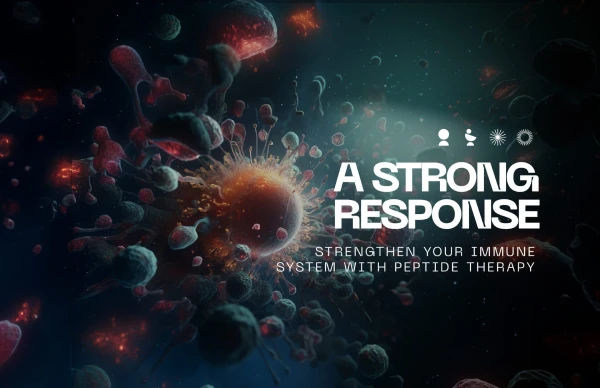Blog
Getting sick all the time – this is the protocol for you

Contents
The challenge of constant sickness
The relationship between peptides and your immune system
3 best peptides for your immune system
Enhance your immune system with peptide therapy
Have you heard about using peptides for the immune system? These compounds might be the answer if you want a life of insurmountable resistance to everyday sickness.
Peptides serve as the building blocks of proteins. These amino acid strings have reported anti-aging, muscle-building, and anti-inflammatory properties.
Due to their vital role in the immune system, peptides are big players in immunotherapy. Like proteins, they help the body maintain cellular function, which controls autoimmune responses.
Are you ready to discover the perfect protocol against recurrent sickness? Stick around to learn about the best peptides for immunity and how they work.
The challenge of constant sickness
Getting sick all the time typically comes with a root cause. One of the likely reasons is a compromised immune system. It’s true that you can’t always avoid illnesses. But you can enhance how your body reacts to disease by boosting your immune health.
The immune system is an adaptive complex network that shields you against infection. It consists of several parts, like white blood cells, antibodies, and lymph nodes. When this system is weak, recurring infections become inevitable.
There are many mild to severe disorders that can compromise the immune system. These include HIV, viral hepatitis, malnutrition, and some forms of cancer.
Susceptibility to frequent infections isn’t the only result of a weak immune system. It may also make you experience symptoms on more severe levels.
Side effects occur because your system isn’t effectively fighting pathogens and antigens. Pathogens include bacteria, viruses, cancer cells, toxins, and fungi. Your body fights antigens by producing antibodies. These proteins destroy harmful elements.
Producing antibodies becomes a challenge when your immune system is weak. As a result, you become prone to frequent sickness and infections.
The relationship between peptides and your immune system
The use of peptides for the immune system generates interesting conversations among wellness experts. One of the main topics is whether your immune system is able to defend against invaders on its own. For some, the answer is no.
It’s vital to strengthen your immune defense mechanism against harmful organisms. While there are many established ways to do this, peptide therapy stands out. It’s effective, more natural, and has fewer side effects than conventional treatments.
Peptides are linked by a chemical fuse known as a peptide bond. They’re typically organized into complex structures of less than 50 amino acids. Your body uses them to express changes in your cells. Peptides link to receptors on the outside of cells, telling them what to do.
The increasing popularity of peptides in the health industry can’t be overemphasized. They’re the foundation of many modern medications.
You can find peptides in drugs, supplements, foods, and cosmetics. There are over 60 peptide medicines approved by the US Food and Drug Administration (FDA). More than 140 are also in clinical trials.
There are unique ways in which peptides enhance the body’s immunity. They may be antimicrobial, directly impacting your immune system cells. Some peptides also improve and modulate the immune response to foreign pathogens.
Peptides’ role in immunotherapy is also evidenced by their use in vaccine development. Antigenic peptides are used in clinical trials against various diseases. These include SARS-CoV-2, hepatitis B and C, influenza, HIV, and malaria, among others.
3 best peptides for your immune system
Not all peptides help with the functioning of the immune system. While some are suited for immunomodulation, others aren’t. We’ve curated a list of the best peptides for the immune system below.
1. LL-37
LL-37 is a peptide naturally produced in your body. It’s secreted by epithelial cells and reportedly exhibits antimicrobial activity against multiple human pathogens. As a result, LL-37 may serve as an alternative to antibiotics.
Antimicrobial peptides (AMPs) derive their name from their ability to destroy microbial pathogens. They control bacterial and viral invasions and may regulate infections. LL-37 could trigger the innate mucosal immune response and ward off intrusions.
LL-37 is one of your body’s first defense responses to infection. It’s an effective line against pathogenic invasions that cause wounds and inflammation.
Immunomodulatory benefits of LL-37
The reported immune-assisting benefits of this peptide include:
- Control of fungal invasion
- A viable alternative to antibiotics
- Regulation of bacterial intrusion
- Antiviral effects
- Quick recuperation from wounds and injuries
- Stimulation of immune cells
How LL-37 works
LL-37 is a cathelicidin antimicrobial peptide. These chains of amino acids are expressed in different cells. These include circulating neutrophils and bone marrow cells. They’re also produced in the skin’s epithelial cells, the epididymis, and the lungs.
The LL-37 peptide addresses antimicrobial resistance. This issue happens when bacteria, fungi, viruses, and other pathogens evolve and stop responding to previously effective treatments.
Infections resistant to antimicrobials are difficult to combat and may be fatal. LL-37 may deal with this problem by combating pathogens at their core.
Safety and use
It’s said to be safe to use LL-37 to boost immune function. There have been little to no reported adverse effects of this peptide. Overindulgence is the likely cause of most negative reactions. The main reported side effect is depression, commonly linked to elderly users.
2. Thymosin alpha
Thymosin alpha is a peptide that contains 28 amino acids. It’s created by the thymus gland, which makes up the lymphatic system.
This peptide enhances the functions of T cells, your body’s first line of defense. There are two categories of T cells, and both are influenced by this peptide.
Cytotoxic T cells attack and destroy cancerous or infected cells. Helper T cells are modulatory, sending signals that direct and augment immune cells.
Thymosin alpha also influences B cells, natural killer cells, and macrophages through interaction with different toll-like receptors.
Immunomodulatory benefits of thymosin alpha
The many benefits of thymosin alpha make it arguably the best peptide for the immune system. It may fight off bacterial, viral, and fungal infections. It might also enhance nerve regeneration.
The peptide’s immunomodulatory properties have been deployed against various viral diseases, including:
- Hepatitis B
- Hepatitis C
- AIDS
- Pseudomonas
- Sepsis
How thymosin alpha works
Thymosin alpha serves as a toll-like receptor that stimulates cytokine and interleukin secretion. It could boost your adaptive immune response, resisting cancers and pathogenic infections. The peptide may also strengthen viral antibodies produced in your immune system.
Safety and use
Thymosin alpha is said to be biologically safe to use. There are no negative reports so far in all associated uses. It’s been successfully used as an immune adjuvant in several clinical trials. In 2003, it was deployed as an immunopotentiator for SARS patients.
Don’t administer thymosin alpha by yourself. Always consult a medical practitioner trained in dosing. Avoid inappropriate dosing. It may lead to side effects like nausea, muscle aches, redness, and tiredness.
3. Thymalin
Thymalin is a peptide that may boost immune function. It’s isolated from the calf thymus and reportedly regulates pain and inflammation. According to research, thymalin may be an effective immunocorrector. It’s shown to have positive impacts on cell-mediated immunity.
Apart from immunostimulant benefits, thymalin could combat heart disease. The peptide is also potentially adoptable in HIV vaccinations.
Thymalin triggers your thymus to produce more B cells and T cells. It may enhance your immune system to combat infections, antigens, and viruses.
Immunomodulatory benefits of thymalin
Thymalin has ample immune-enhancing benefits, including:
- Stabilization of immune responses
- Regulation of the T cell/B cell ratio
- Improvement in cell regeneration, which accelerates recovery
- Prevention of immune suppression
- Treatment for viral and respiratory infections
How thymalin works
Thymalin works by regulating the immune response in your body. It activates your thymus, leading to the secretion of B and T cells. This normalizes the differentiation and proliferation of your immune cells.
The peptide also activates T cells by binding to their receptors. Human T cells have receptors with two polypeptide chains: alpha-beta and gamma-delta.
Safety and use
Thymalin is shown to have safe biological use for many immune system challenges. It pairs well with antiviral medication, causing no known adverse effects. The physiological and immune-assisting effects are moderate. It doesn’t overstimulate your immune response.
A minimal dosing schedule is essential when using thymalin. It’s also important not to self-administer it. Consult a medical expert on how and when to use it for effective immune functioning.
Enhance your immune system with peptide therapy
There’s no better time to use peptides for the immune system than now. These short chains of amino acids are showing remarkable results as immunomodulators. Their maintenance of immune system homeostasis is shown to be safe and effective.
Why not embrace peptides as an immune booster by making your pick at our shop? At LIVV Natural, we have an impressive collection of premium peptide products. Enjoy expertly crafted protocols against everyday sickness.
Author: Dr. Jason Phan NMD – Founder of LIVV Natural – Anti-aging – regenerative medicine – peptide therapy


